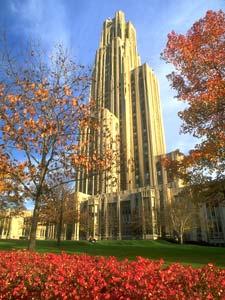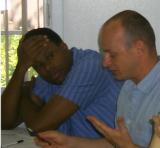|

Cathedral of Learning
|
Who are we? English department, University of Pittsburgh, Partner department Contact person:
Eric Clarke, Director of Graduate Studies, Department of English,
University of Pittsburgh, Pittsburgh, PA 15260, 412.624.2976,
eclarke@pitt.edu CID Leadership Team:,
David Bartholomae (department Chair), Don Bialostosky, Paul Bove,
Stephen Carr, Eric Clarke, Lucy Fischer, Catherine Johnson, Ronald A.
T. Judy, Valerie Krips, Marcia Landy, Adam Lowenstein, Richard Purcell,
Jim Seitz, John Twyning, Stefan Wheelock
Pitt English Home Page
This is a link to the department's website.
PhD Program in Cultural and Critical Studies
This is a link to the PhD program website.
|
|
|
|
What do we want to accomplish in the CID? By
working with the CID, we hope not only to build on our own experience
with innovation in English studies, but also to extend this experience
into a wider discussion with others in our profession. We are
especially interested in assessing the current state and future of
"cultural and critical studies," improving the environment for
intellectual exchange among faculty and graduate students in our
department, and reforming the steps our students take toward writing
the dissertation, particularly in relation to the "comprehensive
examination."
|
|

Richard Purcell and Eric Clarke at the 2003 CID convening
|
How do we represent ourselves to ourselves and to others? Our
participation with the CID builds on our department's history of
self-scrutiny, in relation both to our own work and to that of English
studies more generally. The documents available below describe the
fundamental intellectual orientations of our department, the nature of
our CID deliberations, and the structural and intellectual elements of
our PhD program.
Key Ideas PowerPoint
This document presents some of the key ideas that have informed our department's CID deliberations.
PhD Program PowerPoint
This document presents the key features of our PhD program.
Exemplary Element: Structural & Curricular Innovations
This is a link to a snapshot describing our previous revisions to the structure and core curriculum of the PhD program.
|
|
|
|
What are we doing? Faculty Seminars.
This is a series of seminars designed to encourage intellectual
exchange between faculty and graduate students, These semianrs are also
opportunities for us to assess more fully the kinds of intellectual
work carried out in our department. These seminars were organized by
the three main departmental programs that together form the PhD
program: Literature (including Children's Literature); Film Studies;
and Composition and Rhetoric . These seminars were held throughout the
2004-05 academic year. PhD Project.
This is our version of the comprehensive examination, and we have been
discussing ways tio improve this exam for over two years. These changes
to the Project first emerged as recommendations from the 2003 CID
convening, and reflect discussions in the Leadership Team and the
department. They are more fully discussed and documented on the our
Innovation page.
Faculty Seminar Report
This document is an abbreviated version of a CID subcommittee report outlining our plans for a regular Faculty Seminar.
PhD Project Recommendations
This document outlines proposed changes to our PhD Project that emerged out of the 2003 CID convening.
|
|
|
Timeline AY 2004-05.
During the academic year we initiated a series of three Faculty
Seminars. These seminars are designed to highlight the intellectual
work of the department, in terms of both individual faculty research
and faculty-graduate student work. They are also desinged to present
the department with as clear a picture as possible of what kinds of
intellectual work we do so that we are as fully informed as possible
before initiating any changes. The department will be supplied with
data detailing PhD Project committees, dissertation committees,
dissertation titles, and placement of students over the past 12 years. Fall 2004.
By the end of the fall term we organized a department-wide colloquium
on our current PhD Project regulations and the proposed revisions that
emerged from the CID convening. We also had the first of our Faculty
Seminars. Spring 2005. In March 2005 the department approved a set of changes to the PhD Project. We also held the final two Faculty Seminars. Fall 2005. Initiate changes to the PhD Project regulations.
|
|
|